The article argues that the traditional consulting model—built on selling hours of human expertise and analysis—is undergoing a profound transformation driven by artificial intelligence. The author observes that many of the repetitive, analytical tasks once done by teams of consultants are now increasingly automatable, and that large clients are beginning to realise they can get similar or better outcomes faster and cheaper. The implication is that the differential value consulting firms used to offer is eroding.
One core point is that AI is not merely enhancing efficiency, but challenging the economic logic of the billable-hour model itself. When a multi-million-dollar consulting engagement can be largely supported by AI tools rather than armies of junior analysts, firms are forced to rethink how they price, deliver and structure their work. The article emphasises that clients will increasingly ask for “outcomes” rather than hours logged.
Additionally, the piece highlights how consulting firms must shift toward higher-order value: strategy, judgment, creativity, integration of technology and transformation execution—not merely analysis. The new competitive frontier is no longer “who can analyse best” but “who can architect, orchestrate and execute change using AI as a core lever”. Firms locked into legacy models face risk of being undercut by more agile players.
Finally, the article offers a strategic warning: consulting firms need to proactively redesign business models—moving from time-based billing to outcome-based or subscription-based pricing, embed AI deeply into their operating model, and re-train their workforce for advisory and partnership roles rather than manpower-intensive delivery. Those that do so may thrive; those that don’t may struggle as AI reshapes the sector.


